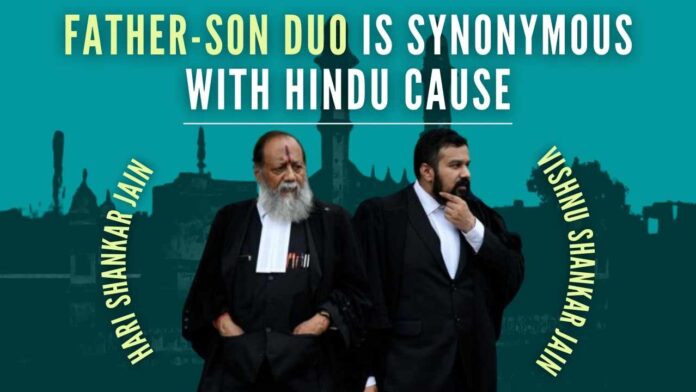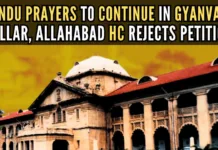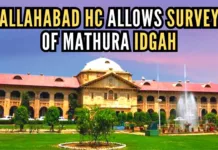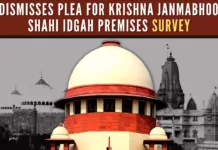
Jains pledge to work tirelessly till Hindus get back all their cultural heritage and places of worship
The father-son duo – the lawyers in the Gynavapi-Shringar Gauri case are busy battling up legal support for other Hindu places that were demolished to build mosques. Together, they have filed around 110 cases across various courts, seeking worship rights for Hindus or representing Hindu deities.
Lawyer Hari Shankar Jain, 68, is now spearheading the legal battle in the Gyanvapi mosque case. His son, Vishnu Shankar Jain, 36, is also at the forefront of all these high-profile legal battles.
The senior Jain and his son Vishnu Shankar Jain, are now an integral part of all legal battles for ‘Hindu shrines‘ — from Gyanvapi to Idgah in Mathura and the Qutub Minar in Delhi.
Hari Shankar Jain drafted six applications that were filed in Varanasi District Court, including the one in which his son is representing five Hindu women in the Shringar Gauri case. In addition to this, he has filed five more petitions, either claiming to be a friend of Hindu deities or seeking a Hindu right to worship them.
Hari Shankar Jain had represented the Hindu Mahasabha in the decades-old Ram Janmabhoomi-Babri Masjid dispute that was decided in favour of Hindus by the Supreme Court on November 9, 2019.
Hari Shankar Jain said, “Injustice meted out to the Hindus angers me. I will continue to fight legal battles till Hindus get back their places of worship.”
The elder Jain had begun his legal career in Lucknow and thereafter relocated to New Delhi to practice in the Supreme Court. His son Vishnu Shankar Jain has been practicing law since 2010.
Jain, when asked how he manages to contest so many cases at one time, said, “I draft the petition and build a fool-proof case. Thereafter, I select local petitioners to make the case stronger.”
The father and son are also contesting the Krishna Janmabhoomi-Shahi Idgah case in Mathura and the Qutub Minar dispute in Delhi. The Jains are confident of victory as they claim that “facts are in the favour of Hindus.”
Talking about the Places of Worship Act, 1991, Jain said, “The Places of Worship Act (1991) is not applicable in almost all the cases I am contesting, including the Gyanvapi dispute in Varanasi and the Shahi Eidgah in Mathura. The Hindu community had access to all these shrines on August 15, 1947, and was regularly carrying out puja and other rituals.”
In Mathura, he has filed a petition on behalf of Lord Krishna, seeking the removal of the Shahi Eidgah adjacent to the Shri Krishna temple complex in Mathura and the transfer of 13.37-acre land to the deity.
“I have filed another lawsuit in the district court of Indore, seeking religious rights for Hindus to perform puja at the Saraswati temple in Bhojshala (in Madhya Pradesh) throughout the year,” he said.
The father-son duo has pledged to work tirelessly till Hindus get back all their cultural heritage and places of worship back.
[With Inputs from IANS]
PGurus is now on Telegram. Click here to join our channel and stay updated with all the latest news and views
For all the latest updates, download PGurus App.
- Siddaramaiah govt under NCBC lens after it pushes for Religion-based quota in Karnataka - April 24, 2024
- RBI bans Kotak Mahindra Bank from onboarding new customers via online, mobile banking channels and issuing new credit cards - April 24, 2024
- JP Morgan CEO lauds economic reforms by Modi govt; says PM Modi lifted 400 mn people out of poverty - April 24, 2024











More power to the Jains